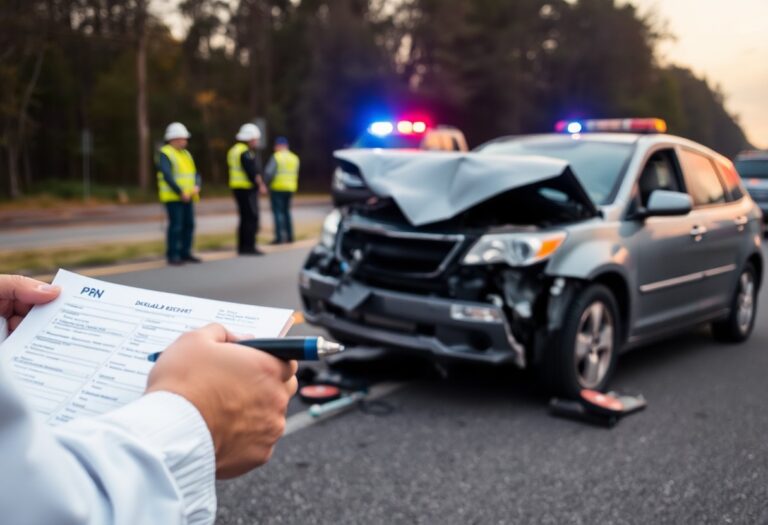Just when you think you have everything under control, an accident can change everything. In Waukesha County, navigating the accident report system can be overwhelming and complex. This guide is designed to help you easily access and understand the necessary procedures for obtaining your accident report, ensuring that you have the support you need post-incident. By following the steps outlined here, you’ll be equipped to handle the situation effectively, allowing you to focus on your recovery and moving forward.
Decoding the Accident Report Process in Waukesha County
Understanding the accident report process in Waukesha County involves familiarizing yourself with the various steps that take place from the moment an incident occurs to the final report submission. In this county, the process typically begins with the police department arriving at the scene, securing details, and collecting statements from involved parties and witnesses. This foundational information is imperative for crafting an accurate and comprehensive report.
Key Agencies Involved
Several key agencies play vital roles in the accident report process in Waukesha County. The Waukesha County Sheriff’s Department oversees investigations in unincorporated areas, while local police departments handle incidents within city limits. Additionally, the Wisconsin Department of Transportation provides guidelines for report completion and follows up on data for statistical analysis, ensuring that proper procedures are adhered to.
The Journey from Incident to Report
The progression from an accident to the finalized report involves multiple stages, beginning at the accident scene and culminating in a documented account that serves both legal and insurance purposes. Initially, officers gather critical information, including the time, location, and conditions of the accident, alongside statements from those involved. Once the data is collected, officers compile a report using standardized forms that adhere to state guidelines. This report undergoes thorough review and, depending on the complexity of the accident, may take several days to finalize. After approval, the report is submitted to the relevant agencies and made available to involved parties, ensuring that you have access to the documentation needed for any subsequent claims or legal proceedings.
Essential Components of an Accident Report
A well-structured accident report is vital for any legal or insurance matters that arise after an incident. Key components include date and time of the accident, location, information about involved parties, including their contact details and insurance information, as well as witness accounts and any injuries sustained. Capturing this information accurately can significantly influence the outcome of your claims process and potential legal disputes.
Information You Must Capture
Capture every detail you can about the incident to create a comprehensive record. This includes the make and model of vehicles involved, state of road conditions, weather at the time, and even photographic evidence of the scene. Ensure you gather identifying details of all parties, such as their names, addresses, and license plate numbers, which can be vital for insurance purposes.
Common Pitfalls to Avoid
Avoid vague descriptions and assumptions in your accident report. Common mistakes include failing to note witness details or neglecting to mention road signs or signals that could clarify the situation. Be cautious about making statements that could be interpreted as admitting fault, as these can complicate your case later on.
Many individuals underestimate the impact of insufficient details in their reports. Without fully documenting the scene, including the positions of vehicles and the condition of the road, your account might lack credibility if disputes arise. Additionally, a lack of witnesses or their contact information can hinder your ability to validate your claims. Always be thorough to protect yourself and ensure your interests are represented accurately in the event of a dispute.
Accessing Your Accident Report
Securing your accident report can be streamlined by knowing exactly where and how to request it in Waukesha County. You will find that various avenues are available, depending on the nature of the accident and the involved agencies. Ensuring you follow the proper channels will help you avoid unnecessary delays and obtain your report efficiently.
Official Channels for Report Requests
The primary method for obtaining your accident report in Waukesha County is through the local police department or the sheriff’s office, depending on where the incident occurred. Requests can typically be made online, by mail, or in person at their respective offices. Check their websites for specific locations and contact information to get started on your request.
Understanding Fees and Processing Times
Fees for obtaining accident reports vary based on the agency and the type of report requested. Processing times can also differ; while some reports may be accessible online immediately, others might require a waiting period of up to several weeks due to administrative processing.
For instance, the Waukesha Police Department determines the cost for accident reports to be generally around $5. However, additional fees could apply for more extensive documentation, such as photographs or audio recordings. You might encounter a processing time of three to five business days for standard requests, with more complicated cases potentially taking longer. Always factor in both the cost and time frame when planning to access your accident report to manage your expectations effectively. Keep handy any details regarding the accident, as this will expedite the process.
Leveraging Your Accident Report for Legal Support
Your accident report serves as a key piece of evidence when navigating the complexities of legal support. This document not only provides a factual account of what occurred but also outlines any potential liability and damages involved. By understanding the nuances in your report, you become empowered to discuss your case effectively with legal professionals, maximizing your chances of a favorable outcome in negotiations or court proceedings.
How Attorneys Utilize Your Report
Attorneys examine your accident report to identify specifics that can strengthen your case. They look for elements like witness statements, police findings, and diagrams that illustrate the scene. This information helps them build a coherent narrative, establish negligence, and accurately assess damages, making your accident report an vital component of their strategy.
The Role of Insurance Companies in the Claims Process
Insurance companies play a pivotal role in how claims are processed following an accident. They assess the accident report along with other evidence to determine liability and compensation amounts. Understanding what they are looking for in your report can aid you in presenting the most compelling case possible.
When insurance adjusters review your accident report, they focus on inconsistencies, corroboration of expenses, and the overall clarity of the information provided. They use this report to gauge the legitimacy of your claim, often calculating reparations based on fault percentages outlined in the document. For instance, if the report indicates clear liability on one party’s part, the insurance company is more likely to take a favorable stance towards settlement. Conversely, any ambiguity can lead to delayed payouts or offers that don’t reflect the true extent of damages. Therefore, ensuring your report is comprehensive and accurately reflects the situation is vital for smoother dealings with insurers.
Prevention and Education: What to Do After an Accident
Understanding the steps to take immediately after an accident can help minimize confusion and stress during such a challenging time. Being prepared with knowledge about your next actions can also aid in ensuring your safety and protecting your rights as a driver. Knowing what to do fosters better outcomes for you and others involved.
Immediate Steps to Take Post-Accident
After an accident, prioritize checking for injuries and ensuring everyone involved is safe. Move vehicles to a safe location if possible and call the police to report the incident. Collect vital information such as names, contact details, license plates, and insurance information from all parties involved. Take photos of the scene, vehicle damages, and any hazards that contributed to the accident. This documentation is vital for any potential insurance claims.
Resources for Driver Safety and Accident Prevention
Numerous resources are available to enhance your driving safety and reduce the chances of an accident. Local organizations, state departments, and online platforms offer educational materials, courses, and workshops focused on accident prevention strategies. For example, the National Highway Traffic Safety Administration provides a wealth of information on safe driving techniques and traffic regulations, while local safety campaigns often promote awareness around common hazards in Waukesha County.
In addition to official resources, consider taking advantage of community events focused on driver safety or enrolling in defensive driving courses. Many organizations, including the American Automobile Association (AAA), offer programs designed to sharpen your driving skills and awareness, highlighting important topics like distracted driving, weather-related challenges, and pedestrian safety. Furthermore, engaging with local groups can connect you with fellow drivers who share valuable experiences or tips, further enhancing your preparedness on the road.
Summing up
So, as you navigate the accident report system in Waukesha County, Wisconsin, you can feel confident knowing that support is available to guide you through the process. By understanding the necessary steps and accessing valuable resources, you will be better equipped to manage your situation effectively. Whether you need assistance with filing a report or retrieving important documents, you have the tools at your disposal to ensure your needs are met promptly and accurately.













